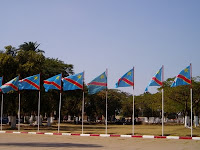 L’actualité politique en RDC sera de plus en plus dominée par les débats autour des élections prévues pour la fin de l’année. Il s’agit, notamment, de la nouvelle loi électorale, le rôle du CENI, l’évolution de la composition de la famille présidentielle, le financement des élections (y compris la participation des partenaires internationaux), la sensibilisation des électeurs et comment l’opposition va pouvoir se positionner.
L’actualité politique en RDC sera de plus en plus dominée par les débats autour des élections prévues pour la fin de l’année. Il s’agit, notamment, de la nouvelle loi électorale, le rôle du CENI, l’évolution de la composition de la famille présidentielle, le financement des élections (y compris la participation des partenaires internationaux), la sensibilisation des électeurs et comment l’opposition va pouvoir se positionner.Or, il n’est pas inutile de rappeler que confondre élections et changement démocratique sera une grave erreur. Nous l’avons déjà vu en 2006 : gagner les élections et s’approprier le pouvoir ne se traduit point par l’amélioration de l’accès à l’espace politique des Congolais ordinaires. L’objectif du Président Kabila et ses alliés est la consolidation du pouvoir et non pas son partage.
Les élections vont avoir lieu, peut-être avec un retard, et Kabila sera probablement réélu. Mais cela n’est pas la question la plus intéressante. Le vrai débat c’est comment les élections pourraient contribuer aux changements positifs. C’est une question le plus souvent escamotée – et ça c’est la malheureuse masquerade.
Les élections vont avoir lieu, peut-être avec un retard, et Kabila sera probablement réélu. Mais cela n’est pas la question la plus intéressante. Le vrai débat c’est comment les élections pourraient contribuer aux changements positifs. C’est une question le plus souvent escamotée – et ça c’est la malheureuse masquerade.





